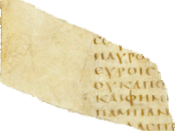Tragic heroes from Greek tragedies almost always share similar characteristics. Medea from Euripides's play Medea and Clytemnestra from Aeschylus's play Agamemnon display and share tragic traits. They are both vengeful wives who share similarities in the cause of their vengeance but have some differences in their chosen means of revenge; as a result of successfully exacting their revenge both Clytemnestra and Medea cause their own downfall.
Both Medea and Clytemnestra seek to hurt their husbands for betraying them. Medea uses the best source of revenge ever. She uses Jason's own children against him. For her own pride, not to look like a fool in front of anybody, Medea kills King Creon's daughter Glauce, who is to be married to Jason, and her two children. She kills Glauce by sending her children with poisoned clothing for the princess, which also leads to the murdering of her children. She tells Jason "They died from a disease they caught from their father" (Medea 2).
Killing her children is the revenge she chose because it was the best one. A woman cannot take a man's children away from him. Men become so weak when they loose their children, especially sons. Medea says "Never again alive shall he see the sons he had by me, nor any child by his new bride of his poor girl, who has to die a wretched death poisoned by me"(Medea9). She leaves Jason with no one. By killing her sons, there is no one left to take the throne, or to carry on his name. To take a man's sons, is the worst thing a woman can do because it takes the masculinity out of them, and they feel low. Medea knew this, and that is why she killed her sons, so he could feel horrible forever.
Clytemnestra single-handedly...


